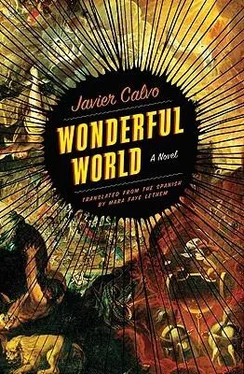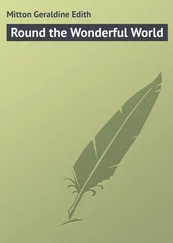Mr. Travers collapses into the armchair again. In front of the fire, one of his cats is licking his paws with a sleepy face. Iris Gonzalvo hasn't asked about the painting over the fireplace again. The Somnambulist in the Ambulance. After a month of coming to this room twice a week, she's made her own interpretation of the painting's composition of colored splotches. Although maybe it's merely a matter of suggestion. Her seeing the man lying inside an ambulance. A man that for some reason she now sees with a beard and dressed in women's clothing.
“Exactly,” says Travers. “It seems that the last painting in the series took centuries to see the light of day. They had it hidden or well covered. In any case, they didn't think it was appropriate to have it in the church. From the very beginning, Brother Samhael's paintings were seen as dangerous. Something more than a series of religious paintings. They say that just seeing them caused changes to your spirit. In time, they became considered pagan objects.” He leans forward to pet his cats with a strangely wrinkled hand. His hands seem to belong to an older person than the rest of his body. “When you think about it, it's a miracle that they've survived. Don't you agree?”
Iris puts down the magazine she is flipping through. She takes a drag on her cigarette with half-closed eyes.
“Someone told me you believe in magic,” she says. “That maybe you want to use those paintings in some sort of ritual. Do you really think that the paintings, you know”—she shrugs—“have powers?”
“Doesn't their power to terrify people impress you? To make everyone afraid to look at them? To make someone voluntarily lock themselves up in a cell and throw away the key? Or to make people rob and kill for them? Perhaps you need to re-pose the question, Miss DeMink.” Travers lifts up a cat. A Persian cat with yellow eyes. He takes it in his arms as if it were a child and the two, Travers and the cat, stare at her with slightly mocking expressions. “Perhaps we should ask ourselves if what we do with things like those paintings is important. If fate is something we can bend to our wills. That would be true magic. Or if we are just simply characters in a story. And therefore it doesn't matter where we hide. Because fear will always find us. Like that boyfriend you mentioned. I come from an important family of wizards, miss. Starting with my great-grandfather, Mr. Arthur Travers. Perhaps you've read something about him. But now.” He makes a gesture that seems to indicate impotence, or at least a certain mysteriousness. “Does it matter if we use those paintings to invoke an angel, or a demon? Using them as talismans? Or if we melt down the canvas and paint and breathe in the vapors to fill ourselves with their power? That, young lady,” says Travers, and Iris feels the weight of both the man's and the cat's gazes upon her, “is something that we'll only know if we try. Don't you think?”
Iris Gonzalvo stands up. She starts to walk through the smoking salon of Mr. Travers's palace in central Paris. During the weeks she's been coming there, she has grown used to finding ways to pass the time in that room. Reading magazines while Travers talks, or even doing the crossword puzzles in the newspaper and nodding once in a while or saying “mmm” in that way people say “mmm” to indicate that in some part of their mind they're still listening. Most of the time, however, she walks around the room. To the point that she is already familiar with most of its elements. With the World War II battle reconstructions and with the artworks and antiques piled up everywhere. With the antique toys that always make her think of horror films. With the giant glass display cases filled with curios. Taxidermied things and things in bottles of alcohol. And yet, she thinks now, she's never really understood what kind of place she's in. She has never managed to assimilate on a deeper level the idea of the place and the man locked up inside it. Surrounded by strange things and fake things. She hasn't really considered what that man's mind must be like. Except for the fact that she suspects that the smoking salon and the man's mind must be very similar. If not one and the same.
Now she stops in one of the corners of the room. She stands there looking at something hanging from the wall. It appears to be a fishing trophy. A commemorative plaque with engraved nautical motifs and the framed photograph of the winner proudly holding up the first-prize winning piece. Grabbing it by the tail with an arm sheathed in a glove up to the elbow. Iris furrows her brow. The photograph has suddenly made her think of Lucas Giraut. Wasn't Giraut talking to her a few days ago about something having to do with his family and fishing trophies? She can't remember, and yet she has the feeling that the photograph is important. Important in a way she doesn't understand. Like the room itself. Like the man seated in front of the fire.
“The first day I came here,” she says finally. Without looking at Travers. “You told me that you could explain the meaning of everything to me. I mean, the meaning of what we're doing. Why we're here and all that. You told me that you were the character in this story that had the answers.” She runs a finger along the fishing trophy plaque and looks at her fingertip. It's black from the layer of dust covering the plaque. “What exactly did you mean by that?”
“I mean that I'm the only one that knows the whole story.” Travers's tone isn't mysterious. It is simple and natural. As if he were saying something perfectly obvious. “From the beginning. From Camber Sands. From the Down With The Sun Society. After all, I'm old enough to remember everything. You can't know a story's ultimate meaning until you know the whole story.”
Iris Gonzalvo runs her fingers over the plaque on the trophy to remove the dust covering it. Until she can read the inscription. The plaque says that the winner of this first prize for deep-sea fishing is Estefanía Giraut. The trophy seems to be more than thirty years old.
“Do you also know what's going to happen?” says Iris finally. After thinking for a moment. “Do you know what's going to happen with the paintings? Will there be a deal? Are you going to keep them?”
Travers lets out one of his affable, crowing laughs.
“Is that a trick question?” he says. “Are you trying to worm an answer out of me?” He pauses, during which Iris can imagine him perfectly, stroking his cat's head. In that way that certain characters in vampire stories stroke cats' heads. “Don't worry. I'll make a deal with you. I'm interested in buying the paintings. You can tell your bosses. Everything is moving forward. As much as it pains me to lose you. But by my age, I've learned to get over farewells.”
Iris Gonzalvo approaches the sofa where Travers is seated. With her arms crossed.
“And that's it?” she says. “That's all? That's the only thing I had to do? Sit here two afternoons a week for a month and wait?”
The way her arms are crossed is that way some people cross their arms when asking for an explanation. Especially some mothers or wives or teachers.
“Waiting is undervalued these days,” says Travers, completely calm. “Imagine, in centuries past, people used to wait entire decades for the stars to align in a particular way. In your case, you just waited for certain things to happen.”
Iris Gonzalvo takes her red leather Adeline André coat and her purse from one of the room's coatracks. She puts on her coat herself and takes out the satellite phone to see what time it is. Then she turns for the last time.
“One more question,” she says, looking toward the flames in the fireplace.
“Yes?”
“What does the painting mean?” she says. “The one with the people hiding in the caves.”
Читать дальше












